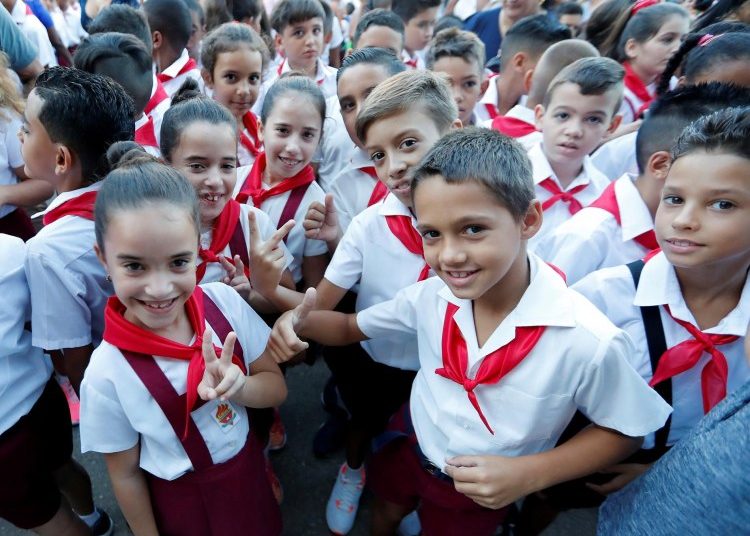The Cuban government suspended the school year as of March 24 to prevent the expansion of COVID-19, a disease of which there were 40 confirmed cases on the island until this Sunday. The closure will extend for three weeks. The fourth week is the one corresponding to the school break. Therefore, starting this Tuesday, and for a month, teaching activities will stop.
Classes would resume on Monday, April 20, depending on the epidemiological situation at that time.
This was announced on Monday by Prime Minister Manuel Marrero in the Mesa Redonda television program, dedicated to explaining the measures taken by the Cuban authorities to confront the pandemic, with the participation of officials from various ministries in the country. Marrero cited concerns associated with overcrowding and hygiene. “Many agree that being at school is safer than being on the street, but there are concerns about overcrowded or hygienic conditions in some schools, which has been the subject of analysis,” he said.
He said that details would be given about facilities for working parents, as well as about daycare centers, which will continue to be open. “The aim is that working parents have facilities and possibilities to continue working, because the economy does not stop and we must continue producing, especially in basic activities,” he said.
The suspension of classes was one of the measures most requested by Cubans to slow the advance of the coronavirus, along with the closure of the borders to tourism, already announced last Friday. However, until now the government had refused to close schools and universities, and had opted to strengthen hygiene and the surveillance of suspected cases in these centers.
Regarding other measures, he specified that during this weekend the isolation of Cubans who have come from abroad has taken place in their own homes, but that as of Monday they would be housed in isolation centers for two weeks. “For this, educational centers that meet the indicated requirements have been chosen, some of which were being used; camping and public health facilities have also been chosen.”
As to the performance of departures, Marrero announced that last Sunday ten times more foreign tourists left than the number of those who entered, that is, more than 7,000. In addition, 1,500 Cuban emigrants and 1,720 Cubans residing in the country also departed. “This is a difficult situation to understand,” he said, “which is troubling because of the difficult moment being experienced by the world.”
And further on he added: “We have decided that a decision must be made to end this trend, which is why the departure of all our compatriots from national territory is being regulated from now on for a simple reason: to take care of their health, their relatives, their neighbors and coworkers.”
He announced that they may leave for humanitarian or other justified reasons. “We would be irresponsible if we were stimulating these exits from the national territory,” he concluded.
Marrero said that the government had decided to suspend interprovincial transportation. Despite the insistence that people refrain from unnecessary travel and stay at home, he said, an average of 22,000 persons are traveling between the different provinces every day. “This situation is unsustainable, due to the high risk and vulnerabilities, these 22,000 persons are 22,000 traveling risks; therefore, as a government, we must control it.”
As for urban transportation―the buses―the Ministry of Transportation was told to make an in-depth analysis of this problem, especially in the case of articulated buses, which transport up to 150 people. He said that about two million Cubans are transported daily by buses in urban areas.
“We reiterate the importance of self-isolation in places of residence. We call on the number of people who every day unnecessarily use public transportation, putting their health at risk as well as that of others,” he said.
The Cuban government, he said, made other decisions such as the closing of discos, in addition to control measures in gastronomy, limiting recreational activities and closing swimming pools and gyms to avoid crowds and contact between people.
These measures will also be adopted in the non-state sector: discos, bars, nightclubs, swimming pools and private gyms must remain closed.
“We have tried to be fair with the non-state sector. The measures to be applied target both sectors,” said Marrero.
On the other hand, he alluded to concerns associated with concentrations of people in commercial facilities and the “lines.” “The sale of chicken is the main cause of the concentration of people. None of the measures is aimed at closing supplies. We have to resolve this concern,” he said.
In the case of the lines, he said that there should be a minimum separation of one meter between people. For this, products will be deconcentrated and a maximum number of products per person will be defined to avoid hoarding for commercial purposes, among others.
Finally, he said: “The coronavirus continues to advance, it is already among us. If all of us are not united, if we do not comply with the measures, the situation could become complicated.”










